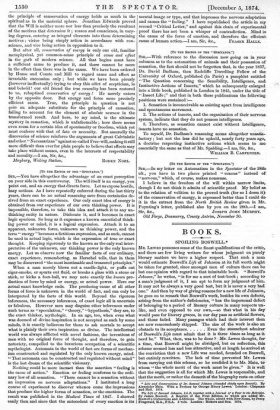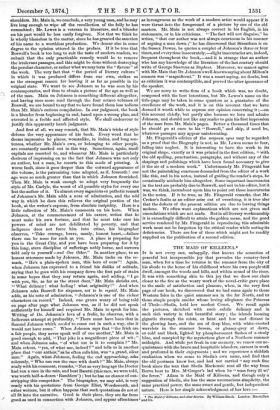BOOKS.
SPOILING BOSWELL.* .1)tin. LEWES possesses some of the finest qualifications of the critic, and there are few living writers for whose judgment on purely literary matters we have a higher respect. That such a man would estimate Boswell's Life of Johnson at its full worth might be taken for granted, since amongst men of culture there can be but one opinion with regard to that inimitable book. " Boswell's Johnson," he writes, "is for me a sort of teat-book; according ta a man's judgment of it, I am apt to form my judgment of him. It may not be always a very good test, but it is never a very bad one." And then by way of giving reasons for a new life of Johnson,. he goes on to remark that Boswell's work, besides its own defects, arising from the author's deficiencies, "has the impersonal defect of belonging to a period of literary culture in many respects un- like, and even opposed to our own,—so that what in his day would pass for literary graces, in our day pass as artificial flowers, and those faded. Many passages which had their interest then are now remorselessly skipped. The size of the work is also an obstacle to its acceptance Even the staunchest admirer of Boswell's Life must admit that it is three times as long as it need be." What, then, was to be done ? Mr. Lewes thought, for a time, that Boswell might be abridged, but on reflection, this scheme seemed less and less attractive, and at length he arrived at the conviction that a new Life was needed, founded on Boswell., but entirely rewritten. The lack of time prevented Mr. Lewes from carrying out this scheme, so he confided it to Mr. Main, to whom "the whole merit of the work must be given." It is well that the suggestion is all for which Mr. Lewes is responsible, and. that the merit, or rather the demerit of the biography rests on other
Life and Conoersatimu of Dr. Samuel Johnson (founded chiefly upon Boswell). By Alexander Main. With a Preface by George Henry Lewes. London : Chapman and Hall. 1874.
The Life of Samuel Almon, LLD, together with a Journal of a Tour to the Hebrides. By James Boswell. A Reprint of the First Edition, to which are added Mr- Boswell's Corrections and Additions. The whole, edited with New Notes, by Percy Fitzgerald, MA., P.S.A. 8 TOL& London : Bickers and Son. 1874. shoulders. Mr. Main is, we conclude, a very young man, and he may live long enough to wipe off the recollection of the folly he has committed ; Mr. Lewes is a veteran in literature, and a blunder on his part would be less easily forgiven. Not that we think he is wholly blameless in the matter, since he has granted the sanction of his name to a worthless production. We demur also in some degree to the opinion uttered in the preface. If it be true that Boswell's book is too long to suit the taste of modern readers, we submit that the only practicable remedy would be to remove the irrelevant passages, and this might be done without destroying the peculiar character, or rather what we may term the "flavour" of the work. The very fact that "the period of literary culture" in which it was produced differs from our own, strikes us -as the strongest reason for leaving it as far as possible in its original state. We want to see Johnson as he was seen by his .contemporaries, and thus to obtain a picture of the age as well as of the man. Main on Johnson is something different altogether, and having once more read through the four octavo volumes of Boswell, we are bound to say that we have found them less tedious -than Mr. Main's curious compilation. In our judgment, the book is a blunder from beginning to end, based upon a wrong plan, and executed in a feeble and affected style. We shall endeavour to justify this apparently harsh judgment.
And first of all, we may remark, that Mr. Main's tricks of style -deform the very appearance of his book. Every word that he -deems impressive he places, womanlike, in italics, and long sen- tences, whether Mr. Main's own, or belonging to other people, are constantly marked out in this way. Sometimes, again, small -capitals are resorted to, and whenever Mr. Main is particularly desirous of impressing on us the fact that Johnson was not only an author, but a man, he resorts to this mode of printing. A worse fault, since it goes deeper than the outward appearance of the volume, is the patronising tone adopted, as if, forsooth I our age were so much greater than that in which Johnson flourished. Then Mr. Main is weak enough to adopt very frequently the style of Mr. Carlyle, the worst of all possible styles for every one but the author of it. To almost every sagacious or pathetic remark of Johnson's Mr. Main adds a note of admiration, and the odd way in which he does this relieves the original portion of the -book, at the writer's expense, from absolute insipidity. Here is a little collection of Mr. Main's comments on his hero. When -Johnson, at the commencement of his career, writes that he must make his own fortune, and that he must take care his
powers of mind are not debilitated by poverty, and that indigence does not force him into crime, his biographer -observes, "Take courage, brave, manly, honest heart,—failure there can be none for such as you. A place is preparing for you in the Great City, and you have been preparing for it by -this long, stern discipline of sufferings nobly borne, and sorrows told only to yourself —and One Other." In another place, to an honest utterance made by Johnson, Mr. Main tacks on the re- mark, "He's a plain-spoken man, this hero of ours"! Again, when Johnson has expressed to a friend his dislike of solitude, saying that he goes with his company down the first pair of stairs in some hopes that they may return again, and adding, "I go -with you, Sir, as far as the street door," Mr. Main shrieks out, ." What delicacy ! what feeling ! what originality!" And when Johnson asks Boswell for sixpence, not to be repaid, Mr. Main adds, as his note of admiration, "Johnson's is one of the richest .characters on record." Indeed, one grows weary of being told on page after page what Johnson was, as if he did not speak sufficiently for himself and required Mr. Main to speak for him. Writing of Dr. Johnson's love of a frolic, he observes, with a ludicrous attempt at profundity, "There must have been that in Samuel Johnson which needed to come out in such a way, else it would not have come." When Johnson says that "the Irish are -a fair people, they never speak well of one another," Mr. Main is good enough to add, "That joke is a magnificent piece of wit ; " and when Johnson asks, "of what use is it to complain ?" Mr. Main echoes, "yes, of what use, indeed?" and tells us in another place that "our author," as he often calls him, was "a grand, silent man." Again, when Johnson, feeling the end approaching, asks solemnly, "Who can run the race with death ?" Mr. Main, always ready with his comment, remarks, "Not so very long ago the Doctor bad run a race in the rain, and beat Baretti (this race, we were told, was worth half-a-dozen ' Ramblers') ; but he has no chance of out- -stripping this competitor." The biographer, we may add, is very wady with his quotations from George Eliot, Wordsworth, and other writers, but it often happens that such quotations do not at all fit into the narrative. Good in their place, they are far from good as used in connection with Johnson, and appear oftentimes as incongruous as the work of a modern artist would appear if it were thrust into the foreground of a picture by one of the old masters. Mr. Main is not always correct in his English, in his statements, or in his criticisms. "The fact will not disguise," he writes, "that our author was not always courteous in his manner of arguing a man down ;" he has discovered that Streatham is on the Sussex Downs, he quotes a couplet of Johnson's three or four times, and every time inaccurately,—slight inaccuracies are, indeed, frequent throughout the book,—and it is strange that an author who has any knowledge of the literature of the last century should write of George Steevens as Stephens. Moreover, we cannot agree with Mr. Main that Dr. Johnson's well-known saying about Milton's sonnets was "magnificent." It was a smart saying, no doubt, but as criticism it was contemptible, and proved the utter ignorance of the speaker.
We are sorry to write thus of a book which was, no doubt, composed with the best intentions, but Mr. Lewes's name on the title-page may be taken in some quarters as a guarantee of the excellence of the work, and it is on this account that we have deemed it worth while to express our opinion concerning it ;—on this account chiefly, but partly also because we love and admire Johnson, and should not like any reader to gain his first impression of the man from Mr. Main's pages. Better a thousand times that he should go at once to his "Boswell," and skip, if need be, whatever passages may appear uninteresting.
Mr. Fitzgerald's edition of the magnum opus may be regarded as a proof that the Biography is not, as Mr. Lewes seems to fear, falling into neglect. It is interesting to have the work in its original shape, exactly as it was printed in the first edition, "with the old spelling, punctuation, paragraphs, and without any of the shapings and polishings which have been found necessary to give it the air of a modern work." Unfortunately Mr. Fitzgerald has not the painstaking exactness demanded from the editor of a work like this, and in his notes, instead of guiding the reader's steps, he occasionally misleads him altogether. Some important inaccuracies in the text are probably due to Boswell, and not to his editor, but it was, we think, incumbent upon him to point out those inaccuracies in the notes. If it be true, as Mr. Fitzgerald remarks, that Mr. Croker's faults as an editor arise out of overdoing, it is true also that the defects of the present edition are due to leaving things undone. We often want explanations which are not given and emendations which are not made. But in all literary workmanship it is exceedingly difficult to attain the golden mean, and the good service rendered by Mr. Fitzgerald in reproducing this admirable work must not be forgotten by the critical reader while noting its deficiencies. There are few of these which might not be readily supplied on the publication of a second edition.



































 Previous page
Previous page